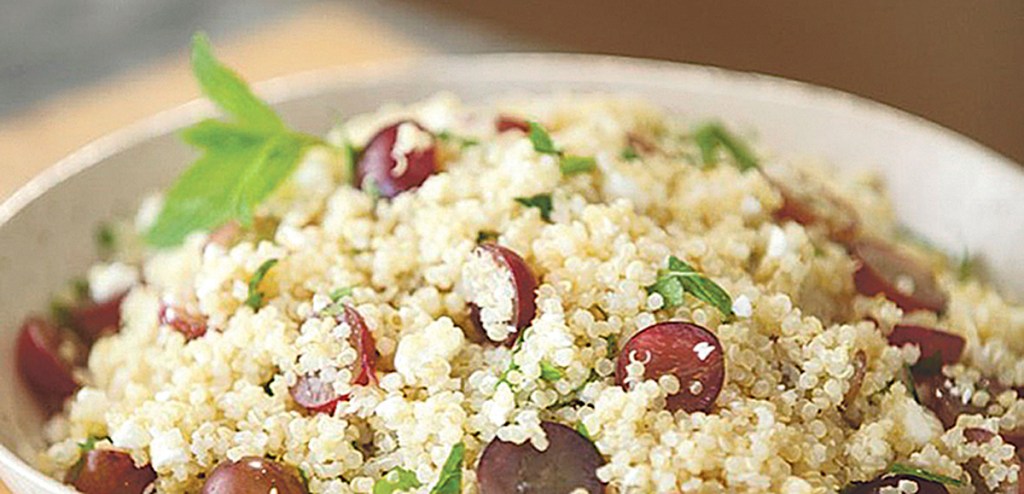Are you still fasting?
Published 5:00 am Wednesday, March 7, 2018

- Grape, Feta and Mint Quinoa Salad makes a refreshing side dish.
Wise choices for National Nutrition Month
How is your fasting coming along? There are more reasons to limit foods, or other habits that have become strongholds in your life. Remember the reason for Lenten fasting is to improve our conscience contact with God. So how are you doing?
Mind, body and soul are all parts of the health equation. Brian Luke Seaward PhD said about “Wellness,” in The Illustrated Encyclopedia of Body-Mind Discipline, edited by Nancy Allison, that the wellness paradigm holds no separation between mind, body, spirit and emotions. All aspects of the human condition are so tightly connected that it is impossible to distinguish one from the other.
An ancient theory that is supported by many experts in several disciplines suggests that each aspect of the human condition is comprised of energy, with the most dense energy being the most obvious and tangible: the physical body.
So why do we too often neglecting or abusing our bodies? It’s a mystery. Fasting and even detoxifying are types of body cleansing that may increase your productivity. Celebrities, coworkers and your Aunt Betty all want to detox on fruits and veggies to rid their bodies of toxins, but your body doesn’t need a special diet severely restricting food intake to rid itself of toxic substances. It does this naturally every day, said LiveStrong.com.
Fruit and vegetable detox diets, like other restrictive diets, are fad diets that make false promises, and they may not be the best choice for everyone. Searching the Internet you may find any number of fruit and veggie detox diets. While they vary in some ways, they all have a similar theme — eating nothing but fruits and vegetables for a set period of time. The time frame of these detox diets usually ranges from one day to a week. Some of these diets also include a detox drink or tea to help with the purification process.
The theory behind the detox diet is that your body is unable to rid itself properly of the toxic substances you ingest every day. These toxins hang around in your body and cause ailments such as fatigue, headaches and nausea. On a detox diet, you give up foods that make your body toxic and instead eat or drink foods that help your body purge itself of toxic substances. Proponents of the diet claim that a detox diet improves health, lowers your risk of disease, gives you more energy and helps you focus.
LiveStrong.com said “There is no scientific proof that a detox diet rids your body of toxic substances.” In fact, your liver and kidneys naturally detox your body every day, removing and eliminating waste, bacteria and other harmful substances through their normal physiological process.
If your liver or kidneys are diseased, they may not be able to rid your body of toxins, but in that case, you need serious medical attention — a detox diet won’t help and may do more harm. Detox diets may also be harmful to certain groups of people, including people with diabetes or heart disease and teens. And, if you’re detoxifying to lose weight, you’re most likely losing muscle and water, not fat. You’ll likely regain the weight once you go back to eating your regular diet.
When your body turns food into energy, it creates free radicals, which are chemicals that damage cells. Food is also a source of free radicals. To prevent harm from these chemicals, you need to eat a diet that is rich in antioxidants. Fruits, vegetables and whole grains are good sources of antioxidants. In addition to antioxidants, if you want to keep your body healthy and energized, you need to eat a variety of nutrient-rich foods from all the food groups. That means including lean sources of protein such as seafood and beans, as well as low-fat dairy, LiveStrong.com said.
Sluggish & Lethargic?
Eating healthy in South Louisiana can sometimes be a problem. We like our foods and we like them fried with mostly carbohydrate side dishes and very little attention given to fruits and vegetables. Balanced meal planning is a stretch. If you started the Lenten season off with a simple fast, you may have found great success or waned as the days have passed.
As a boost to your diet planning, why not try a low-residue diet as an easy way of giving your colon some time to rest and heal. Often prescribed by physicians when bowel issues are present, or in preparation for medical procedures, keeping the gut cleansed is also part of detoxifying, a practice often used to kick start healthier eating.
Controversial, as in any eating plan be sure to consult your physician to insure you are maintaining a healthy regime for your system.
Sometimes changing your dietary habits can boost the way you feel. The basic idea is that you’ll eat foods that are easy to digest and cut back on those that aren’t. A Low-Residue Diet limits high-fiber foods like whole-grain breads and cereals, nuts, seeds, raw or dried fruits and vegetables, according to WebMd.com.
Ask your doctor about changing your diet to increase energy and potential weight loss, not just for weight loss, but to feel better.
Celebrate Good Health Month
March is National Nutrition Month led by a nutrition education and information campaign created annually in March by the Academy of Nutrition and Dietetics. The campaign focuses on the importance of making informed food choices and developing sound eating and physical activity habits.
Registered Dietitian Nutritionist Day is March 14, celebrated the second Wednesday in March. The focus is to increase awareness of registered dietitian nutritionists as the indispensable providers of food and nutrition services and recognizes RDNs for their commitment to helping people enjoy healthy lives. Celebrate those in your life.
The 2018 NNM theme is “Go Further with Food” Whether it’s starting the day off right with a healthy breakfast or fueling before an athletic event, the foods you choose can make a difference. Preparing foods to go further at home and within the community can have a positive impact, as well.
Initiated in March 1973 as a week-long event, “National Nutrition Week” became a month-long observance in 1980 in response to growing public interest in nutrition. Each March, the Academy focuses nationwide attention on healthful eating through National Nutrition Month.
The Academy of Nutrition and Dietetics is the world’s largest organization of food and nutrition professionals. The Academy is committed to improving the public’s health and advancing the profession of dietetics through research, education and advocacy. Visit the Academy online.
To find a personalized plan that works best, consult your doctor or a registered dietitian nutritionist or visit Furtherwithfood.org/resources/ for great tools and resources.





